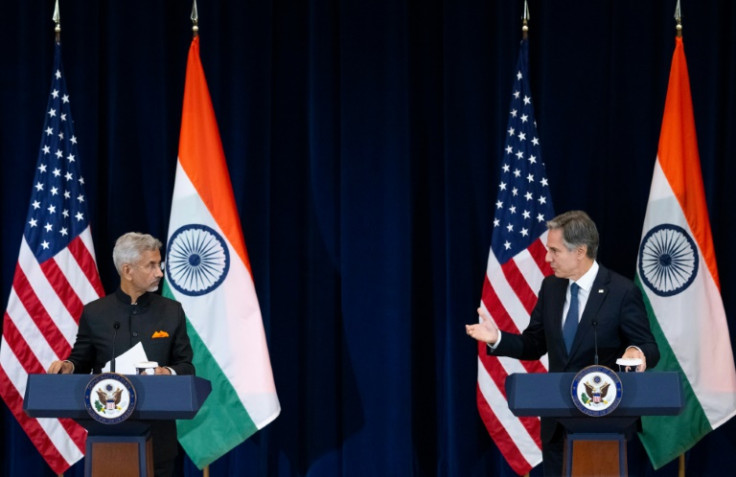US, India To Discuss Concerns About Indo-Pacific, Which Is At 'Center' Of 'New Recalibration'

KEY POINTS
- The U.S. and India will have a 2+2 Ministerial Dialogue, for which Antony Blinken and Lloyd Austin will be traveling to New Delhi
- Blinken's visit to India will follow his travels to Israel, Jordan, Japan and South Korea
- Experts say that security concerns over the Indo-Pacific is a major reason that brings the U.S. and India together
With the shared vision of a free and open Indo-Pacific region, U.S. Secretary of State Antony Blinken and Defense Secretary Lloyd Austin will be meeting their Indian counterparts later this year to discuss "concerns and developments" in the area.
Following a trip to Israel, Jordan, Japan and South Korea, Blinken will be joined by Austin in New Delhi to meet India's Minister for External Affairs Subrahmanyam Jaishankar and Minister of Defense Rajnath Singh.
The 2+2 Ministerial Dialogue will include discussions about "both bilateral and global concerns and developments in the Indo-Pacific," the U.S. Department of State said in a statement.
Washington recently acknowledged how the U.S.-India ties are being bolstered by their shared vision of a free and open Indo-Pacific amidst rising security concerns in the region.
"The Indo-Pacific is now at the center of a new recalibration that U.S. and India, along with other Quad partners as well as other democratic countries have sought," Vivek Mishra, a fellow with Observer Research Foundation's Strategic Studies Program, told International Business Times.
"On the one hand security of the region and a favorable balance of power is essential for both India and the U.S. and this by extension includes ensuring predictability of the SLOCs (Sea lines of communication) in the region," he added. "On the other hand, the Quad countries are leading a technology and infrastructure coalition, which is going to be a central hinge around which competitiveness in the Indo-Pacific will be redefined in the next decade."
Despite differing policies on certain global issues like the Ukraine war, the U.S. and India have largely found common ground on security concerns in the Indo-Pacific region.
For Washington, India is an emerging power in the region that has been gaining the economic muscle and the political influence to counterbalance China, which has left other countries vexed in its hostile moves for more power in the region.
"The deteriorating security environment of the Indo-pacific is a major reason that brings together India and the U.S.," Akash Sahu, an Indo-Pacific geopolitics analyst, told IBT.
"Some shared concerns between the two sides include developments and rising tensions in the South China Sea and the Taiwan straits. Beijing's increasing influence in the Indian Ocean is also worrisome, especially as the new government in the strategically located Maldives may be perceived as more inclined to China whereas Sri Lanka's debt crises has meant a compromise of its strategic autonomy. India and the US have dissimilar policy on the crisis in Myanmar but given New Delhi's border region sensitivities and past experiences of endorsing the pro-democracy movement, it is unlikely that their respective stances will change considerably," Sahu said.
"Non-traditional security issues such as climate change, drug trafficking, information warfare, and cyber-attacks are also potent threats in the region for which both countries can increase their cooperation," he added.
Today, the U.S. and India no longer have a mere building-buyer relationship. The bilateral ties appear to be injected with a new energy with unprecedented levels of cooperation. From nearly zero defense trade until the early 2000s, India not only turned into an important buyer of U.S. equipment, but now was also a strategic partner that was in talks with Washington about producing military systems together.
India has become as useful to the U.S. as the U.S. was to India, Mishra said.
"India is a strong partner and a key anchor for tying the US' Indo-Pacific strategy. This is because there is now an unprecedented level of convergence between the two countries across military, security and political relations. India is as useful to the US in the Indo-Pacific just as much as the U.S. is to India," Mishra said.
"The relationship has come a long way from being a buyer-seller relationship to one of a comprehensive strategic partnership which is guided by an approach of parity in relations. This makes it a very interesting phase of US-India relations, especially with the two countries having signed the four foundational agreements," he added. "As a result of this the cooperation in sensitive tech, critical and emerging tech, semiconductors, AI and other emerging fields will be key in shaping a competitive infrastructure in the Indo-Pacific region, particularly in how its pitted against the Chinese Belt and Road Initiative."
Sahu believes the upcoming 2+2 Ministerial Dialogue in New Delhi will include discussions on greater cooperation on information sharing mechanisms and cooperation on military technology and defense industry.
"These areas can be seen as drivers of their relationship as a common goal may be to manage the rising insecurity in the Indo-Pacific region through participation in different forums like Quad, and devising an aligned approach to engaging like-minded countries," Sahu said.
© Copyright IBTimes 2025. All rights reserved.






















